The best decade of movies managed to last fifteen years, from ’67 to ’82. It was a decade-plus of grim realism, anti-heroes, dark endings, and plotless character studies that existed side by side with absurd comedies, disaster films, bad (mostly) science fiction, and the first summer blockbusters. They were made by manic, cocaine-fueled writer/directors who imagined themselves gods among men and saviors of the art of cinema. For a brief window in time, they were.
By 1980, the gods had come crashing to earth. The producers they’d stomped on climbing to the top took control, and they were done with the sad, the bleak, the meditative, the arty. Producers didn’t want art. They didn’t want social commentary. They wanted money-making machines. They looked to the characters and genres of the ‘70s, carefully excised the ideas at their core, and polished them until all traces of ambiguity, politics, and depression were gone. Which left them with nothing but explosions, naked ladies, and manly heroics. The “summer blockbuster” had been born, an unkillable genre that’s since metastized into an all-consuming beast of doom. For which we blame Jaws and Star Wars, rightfully so. More than any other movies, those two paved the way. The Godfather was a massive hit too, but how do you replicate artfully crafted drama? You don’t. You replicate spaceships and car chases and evil beasts eating chicks in bathing suits.
Blockbusters came in many genres, but the most quintessential genre of the ‘80s is the Action Movie, which I will make special by capitalizing. The term almost doesn’t work for anything made earlier. Applying it to old movies feels kind of wrong and fake, even though action movies have always existed. For that matter, aren’t all movies by definition “action movies”? The word itself implies it—Movie. Moving pictures. Horses running. Trains hurtling. Dinosaurs fighting. Action.
Wages of Fear is a kind of action movie. A French one. With lots of slow talky scenes. But is it an Action Movie? No. It’s just fun to call it one because it’s old and French (and, I might add, completely great and required viewing). The Dirty Dozen is an action movie, and so is The Great Escape. But are they Action Movies? Not exactly. They’re war movies. Goldfinger? The French Connection? Dirty Harry? Shaft? Death Wish? Enter The Dragon? The Towering Inferno? Dawn of The Dead? Rollerball? They’re all about action, but are they Action Movies? It still feels wrong to me. True Action Movies didn’t come into being until ’82. They existed amorphously in the years prior, slowly coalescing into the new genre, as though the ‘70s had to be truly over with before they could show their happy, shining faces.
In ’79 Mad Max came out. I’ll call it a Proto-Action movie. The Warriors and Escape From Alcatraz came out too, almost action movies, but not really. Soon came Superman II, way more of an action movie than Superman, but not yet an Action Movie. We had action/comedies inspired by earlier eras, movies like Cannonball Run, Smokey And The Bandit II, Any Which Way You Can, and The Blues Brothers. None of those are Action Movies. In ’81 came Raiders Of The Lost Ark, still not an Action Movie. Raiders is an adventure movie, a serial, a period piece. It’s all action but it’s not an Action Movie. Neither is Southern Comfort nor Escape From New York, even though those are both right on the line, and if you threatened to beat me up over them, I’d give ‘em to you.
It’s not easy defining Action Movies, even once we make into the right era. Do period pieces ever count? Is The Untouchables an Action Movie? Or is it a crime story? Which there’s the other tricky angle: multiple genres. Raiders is action-adventure, with the emphases on adventure. What about action/comedy? Beverly Hills Cop? That’s right on the line too. Midnight Run? Feels like an Action Movie, and yet, something’s not right. There’s too much comedy. The Karate Kid is a martial arts/underdog sports movie, and Gymkata, well, the less we say about Gymkata the better. Action/sci-fi is equally tricky. Does Predator slide by? I think it does. So too The Terminator. But Aliens? Feels too heavy on the sci-fi. The Empire Strikes Back and Return of The Jedi? No way. They’re science fiction by way of fantasy. Howard The Duck? No! Cut it out!
My idea here was to make a list of the five best Action Movies of the ‘80s. I didn’t know I’d get so hung up on the definition, which goes to show how absurd classifying movies (or anything else) by genre is. It is absurd. What does it get us? I don’t know. I do know that it’s nevertheless impossible for humans not to classify anything and everything into as many tiny groups as possible. Our brains love nothing more. It feels like we’re bringing order to a mad world. Or something.
So. Let’s make this happen. 1982: the year the ‘70s gave birth to Action Movies. The top five of the decade. Only wait, there’s three movies that didn’t make the cut we still need to cover. Though (arguably) not among the top five, these three are uniquely genre-defining.
48 Hrs. (’82)
In which the buddy-cop genre was invented. In The Heat of The Night (’67) is a sort of precursor, matching up a white cop with a black cop, though its main thrust is the exploration of racism. A murder is solved, yes, but nobody makes any snarky wise-cracks. Freebie And The Bean (’74), starring Alan Arkin and James Caan as the buddy cops, gets the wise-cracking right, but it’s still not quite a Buddy Cop Action Movie. It’s too ‘70s-ish. You should check it out. Strange movie. Kubrick loved it.
48 Hrs. was Eddie Murphy’s first movie. He’s a crook taken out of jail by cop Nick Nolte to track down a pair of murderous escaped convicts Murphy used to run with. On the one hand, it’s still got a certain serious darkness left over from the ‘70s, as did so many movies from the first years of the ‘80s, but with Murphy in there, it’s full of wise-cracks, which may or may not hold up today. I haven’t watched it for years, but as a kid I must have seen it 93,000 times. Or so. It worked great back then. Walter Hill directed and is credited with the script along with like five other writers, including Steven E. de Souza and Jeb Stuart, best known for writing Die Hard (which obviously we’ll be getting to). And it features Jonathan Banks, who of late has been incredible as Mike on Breaking Bad.
48 Hrs. led to every other buddy cop movie ever (and their endless sequels), including Beverly Hills Cop, Running Scared, Lethal Weapon, Midnight Run, Tango & Cash, Bad Boys, Rush Hour, and so on into infinity.
First Blood (’82)
Director Ted Kotcheff’s First Blood, starring Sylvester Stallone as a Vietnam vet some small-town cops make the mistake of giving a hard time, began what let’s call the “ex-military loner against the world” genre. Its sequel, Rambo: First Blood Part II, helped spawn (along with Kotcheff’s Uncommon Valor) the “ex-military loner, still against the world but willing to help out just this once, goes back to ‘Nam (or other troubled international locale) to save the MIAs (or hostages) the dadgummed guv’mint left to die!” genre. Although maybe we should give John Carpenter credit for kick-starting this sub-genre with Escape From New York. Although then again, the difference is that in Rambo and its ilk, the hero, though staying a loner at the end, still goes to the trouble of saving the world. Whereas Snake Plisskin says “Fuck it” and lets WWIII break out. Carpenter is too nihilistic to fit comfortably into the Action Movie genre.
So anyway, First Blood, people liked it, it did well, it’s got something going for it, though personally I never loved it. Stallone is a cartoon, and despite it being a much more serious movie than its ever loopier sequels, it’s still full of dopey dialogue and absurd Action Movie heroics. Which is why I’m talking about it. It laid out the template for the outrageousness to follow.
Commando (’85)
More than any other movie, Commando is the outrageousness that followed. It features and/or invents almost every Action Movie cliché you’ve ever seen. You know you’re in for a good time when Arnold Schwarzenegger, playing a character improbably named Matrix, is introduced carrying an entire tree on his shoulder. Following which he eats ice cream with his adorable little daughter. Who is then kidnapped by evil bad guys.
I remember watching this once in college and trying to count up every person Matrix kills in his efforts to get his daughter back. It came out to something like 130, though with the number of buildings he blows up, one can’t be certain. Also, I might have been drunk at the time.
This is where the tradition of the muscled he-man delivering witty lines before offing bad guys began in earnest. Sure, maybe the Dirty Harry movies deserve a little credit for getting the ball rolling, but it’s Schwarzenegger who turned it into an art form. A gloriously stupid art form. Let’s not forget to credit writer Steven de Souza. That’s right, de Souza wrote Commando too. Commando is the kind of movie that when it turns up on cable TV as you’re flipping around, you end up watching the whole thing. Why? Because it’s educational. You want to learn about Action Movies, you watch Commando.
Now that our genre-inventing shout-outs (shouts-out?) are out of the way, I give you the five best Action Movies of the ‘80s. And by “best” I’m talking about legitimately great movies. Not “so bad they’re good,” not “genre-defining though dumb as paint,” not “good for an action movie,” not “brilliant ‘80s cheese,” but genuinely great movies.
5. RoboCop (’87)
Dutch director Paul Verhoeven’s nutty little masterpiece. Some point to Showgirls as his most entertaining movie, however unintentional the entertainment. Others might prefer his two other over-the-top sci-fi Action Movies, Total Recall and Starship Troopers. Those two have their Commando-like moments, and likewise may never be switched away from when found on cable. But they don’t top RoboCop.
RoboCop is hilarious, violent, subversive, ludicrous—and very smart. It’s chock full of damning social commentary, none of which is in the least bit subtle. Verhoeven likes the kind of subtext that lops off your arms and slaps you in the face with them. Beaten about the the head with your own severed limbs! That’s a Verhoeven movie.
Peter Weller does a fine job as a robot who slowly recalls his past humanity. Ronnie Cox and Kurtwood Smith are two of the best villianous scum in Action Movie history. Rob Bottin, famed for his special effects work on The Thing, provides all the goopy horror effects, prime among them the nuclear-waste-covered melting man.
RoboCop isn’t complicated plot-wise. It’s basically a “good guy dies, comes back to life ala Jesus, and kills his own murderers” kind of revenge flick. So yeah, a religious picture, you could say. Watch it again, and be reborn.
RoboCop was one of three notable sci-fi/action flicks of ’87. The other big one is Predator. It’s enjoyable, and ends on a surprising note of emotional emptiness, but in the world of Schwarzenegger, The Terminator it ain’t. The sleeper of the year is The Hidden, which was only barely edged out for this list by RoboCop.
4. Runaway Train (’85)
One of the most underrated movies of the ‘80s. It’s based on an original screenplay by Akira Kurosawa, who never managed to get it made, and directed by Andrei Konchalovsy, who never made anything better. It stars John Voight (in one of his best performances), Eric Roberts, and Rebecca De Mornay, who if you were male and fourteen at the time of its release in ’85 you were madly in love with thanks to Risky Business.
Voight plays a con who escapes from an Alaskan prison in the dead of winter. Roberts, a dopey young guy, tags along. They find their way onto a train, the engineer for which drops dead of a heart attack. It’s a runaway train, people! Get out of the way! For god’s sake, clear everything off those tracks! It’s a train! And it’s running! AWAY!
I admit that the scenes in the dispatcher’s office alternate between par-for-the-course and pretty-goddamn-weak, as they scramble to stop the train. It doesn’t matter. You’re not watching Runaway Train for those scenes. You’re watching it for Voight. Is he insane? Or is he the smartest guy in the movie? Either way, he’s gripping every moment he’s on-screen, which is most of the movie.
Equally driven is the prison warden trying to catch him. Their face-off at the end has a surprising result. This is no typical Action Movie. It’s not about saving the world or damning it. It’s about one man’s fight against himself.
3. Die Hard (’88)
How to describe Die Hard? It’s like Die Hard in an office building.
Die Hard is its own genre, the Action Movie in a single location. Like 48 Hrs. and Commando, it’s co-written by Steven de Souza, a man it turns out we can blame a hell of a lot on, the bastard. Look what he’s done to movies! We’re still suffering the results!
Meanwhile, Die Hard is awesome. No one thought it would be awesome, starring as it did that clown Bruce Willis from that crap TV show Moonlighting. What the hell was he doing in an Action Movie? Turns out he was doing a great job.
Die Hard is rife with all of the Action Movie cliches of the decade. It’s got the evil European criminals, the drugged-out jackass you know is a dead man, the witty line delivered as the bad guy is killed, hints of the buddy cop movie, and at its center the lone hero against impossible odds. But it’s smarter than most of what came before. The simplest smart thing they did was to have their hero suffer believably. Unlike Stallone or Schwarzenegger, Willis is just some guy. He runs around with no shoes on broken glass, gets beat to hell, and more or less seems like a real person, give or take.
The next smart move was to cast a great actor as the bad guy, in this case Alan Rickman as Hans Gruber. Action Movies are only as good as their villians. The better the bad guy, the better the hero looks in defeating him. Rickman plays Gruber with a perfect sneering superiority.
Die Hard functions as kind of a summation of ‘80s Action Movies. It takes what came before and uses it intelligently, while remaining purely what it is. There’s no deeper meaning in the movie, no ambiguous ending, no hint of the ‘70s. It’s ‘80s action, through and through.
The same year saw the release of Rambo III, Red Heat, and Missing In Action 3. The Action Movie was already getting old and stale and redundant (but don’t worry—or do—because it’s never going to die).
2. The Terminator (’84)
When The Terminator came out I was thirteen, too young to get into those those big, bad R-rated movies. I was at my grandmother’s house in Palm Springs and she took me. She loved movies. All I had to do was tell her what we were seeing that day, and off we went.
Sad to say, she didn’t love The Terminator as much as I did. She found it a bit too violent for her taste. You can’t please everyone.
This is James Cameron’s best movie. It’s Schwarzenegger’s best movie. It’s mean and intense and scary and despite its story having been ripped-off (intentionally? accidentally? who can say?) from two episodes of the old TV show The Outer Limits written by Harlan Ellison (whose name was added to the credits of The Terminator after a lawsuit), it felt hugely original when it came out in ’84. A kind of leftover ‘70s darkness drives it, even if its streamlined plot is all ‘80s. It felt like something new.
Few Action Movies have the incessant drive of The Terminator. The pace of the movie matches the plot, about a seemingly unkillable cyborg sent from the future to murder the soon-to-be mother of a future rebel. It’s relentless. It’s genuinely terrifying. The biggest weakness of Terminator 2: Judgment Day is that the feeling of inescapable death is missing. The morphing T-1000 is too futuristic to instill real fear; he’s sci-fi fakery, however cool looking.
Schwarzenegger in The Terminator is fucking scary. He feels real. The movie didn’t cost a lot, and the cheapness adds to the realism. Nothing’s shiny and fake, aside from the cheesy model spaceships in the future, which don’t matter. The movie’s concerned with the here and now, in which you’re going to die. Fun, right? Yay Action Movies!
1. The Road Warrior (Mad Max 2) (‘81)
I know I said Action Movies officially began in ’82. The Road Warrior opened the last week of December ’81 in Australia, and the rest of the world in mid-’82, so it counts, damn it!
There is no better Action Movie. The Road Warrior is a genius piece of perfect cinema. It’s the kind of movie with not a single wasted frame. Every shot propels the story forward. Dialogue is scarce. It plays like a comic book, and not only because of the villians, the Humongous and his colorful, mohawked, motorcycle riding tribe of marauders. It’s like a comic book in how its shot, with each frame pushing the story on. The Road Warrior is the greatest comic book movie ever made.
The original Mad Max is fast-paced, brutal little movie. For the sequel, writer/director George Miller set about making a very different kind of movie, a simple story based on mythic tales of damned men regaining their humanity, and inspired by the syle of Kurosawa’s Yojimbo, among others, in its portrayal of a reluctant savior in a windswept, empty wasteland. Mel Gibson nails the part. In his early days, he was a hell of an actor.
The Road Warrior opens with a brief newsreel and voice-over laying out the post-apocalyptic state of the world and the character of Max. You don’t need to have seen Mad Max to know what’s going on. The Road Warrior functions independently from its predecessor. From there we’re slammed into the empty desert, hauling ass down the road with Max and his dog. He learns of an outpost pumping thousands of gallons of gasoline, and off he goes to investigate.
The movie is full of great characters, and includes my single favorite movie credit: Emil Minty as The Feral Kid. The Feral Kid doesn’t speak. He only grunts. He becomes Max’s friend, his first and only connection to humanity. He’s also got one hell of a boomerang. Watch your fingers.
The chases sequences are among the best ever filmed, especially the truck chase that ends the movie. It’s not easy to pace a long chase in a way that continually ramps up the intensity without flat-lining into an over-edited, boring highlight reel of action “moments.” Miller has this technique of shooting POV shots from cars low to the road in a way that makes you feel like you’re seconds away from death.
The end of The Road Warrior is hopeful in its way, at least for everyone besides Max. Then again, it’s through Max that the others gain their future.
The Road Warrior, like all Action Movies, is full of violence, but it’s not gratuitous. In many cases it’s only briefly shown, or only suggested. Miller intended the movie to seem more violent than it is, at least in terms of what you see. Here’s George Miller on violence:
One thing that has helped me try to put everything into context is the notion that movies are really public dreams…that we share collectively in darkened theaters. And just like dreams have functions, nightmares help us confront our dark sides. The reasons we told these post-apocalyptic allegories, these warning fables, was to help us explore the darker, more unthinkable side of ourselves. These dress rehearsals for our own deaths help us experience that part of ourselves which we are unable to deal with in normal, conscious, everyday living. And I think that’s the kind of impulse that gives rise to the violence in our storytelling. There’s obviously a need for violence in stories, as it has always been present in them, whether we’re talking about biblical stories or children’s fairy tales.
The five Action Movies on this list are all violent, but I don’t think any of them use it without reason. Action Movies, even the bad ones, put us safely into dangerous situations. They give us vicarious thrills of a world we’ll never live in, and wouldn’t want to. We only want to visit. And watch shit blow up.
**And now, a special bonus, check out editor Jacob Bricca’s magnificent montage of Action Movie cliches, Pure**
Pure from Jacob Bricca on Vimeo.


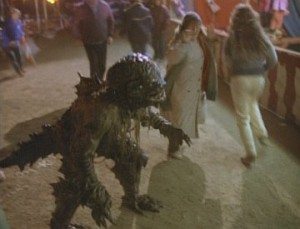
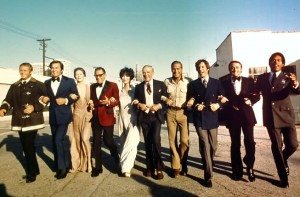
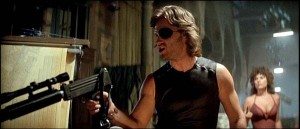
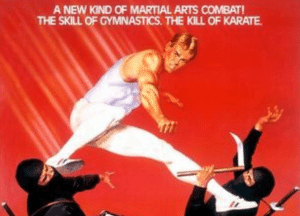
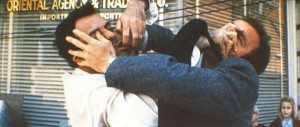

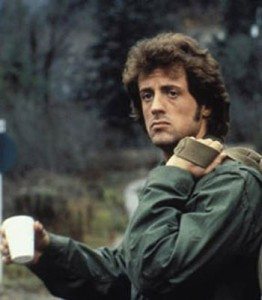
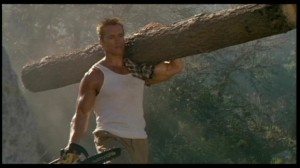
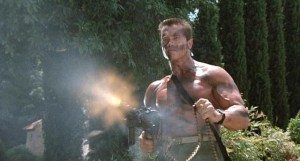

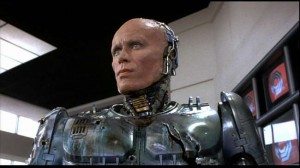
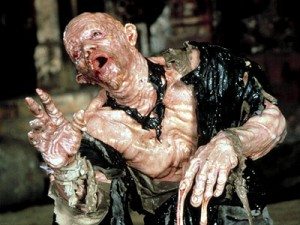
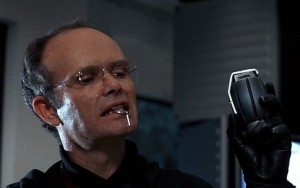
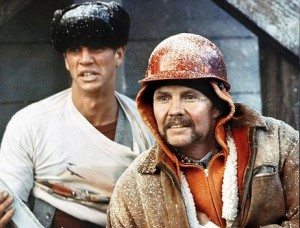
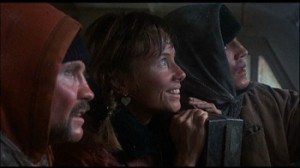
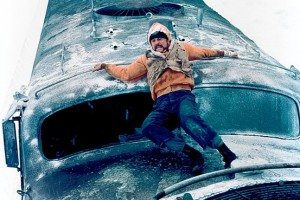
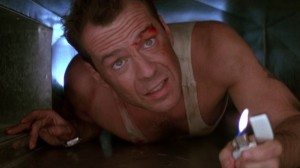
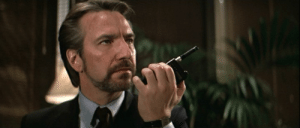
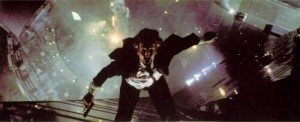
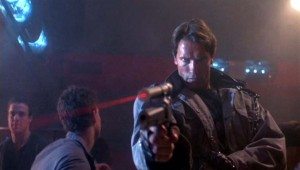
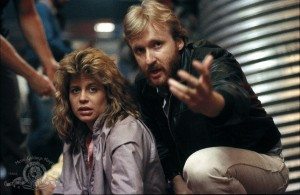
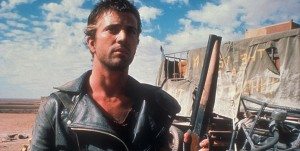
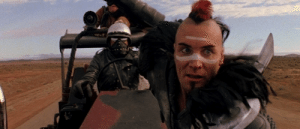
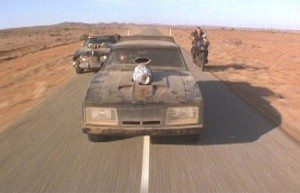

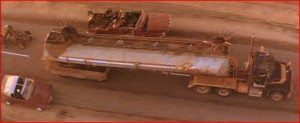
Great list! I love Commando and give a shout out to a nascent Alyssa Milano and one of the best 80s montages ever (deer feeding scene caps it). Making a list of everything that entertains me about that movie may actually take longer than simply watching it.
Two days ago, I saw a rig that’d haul that tanker. You want to get out of here? You talk to me.
A great film. Not just a great “Action Film”, a great film.
All of the chase sequences are exemplary, with the final, tanker-truck chase again transcending the genre and landing deservedly in the conversation of most thrilling sequences ever filmed (and edited). It’s as breathtaking and alive today as when it was shot, in a way that I guarantee no action sequence shot in the last decade will be in the same amount of time. There’s a true, overpowering sense of adrenaline and danger that sweats from it in sheets; it’s almost suffocating at times, like you’re riding the whirlwind of world gone mad and teetering on the edge of losing control, beyond mere anarchy to a pure dissolutionistic orgasm of speed and impact and physics and will and pain and monkey-brained fear.
No CGI,
No green screen.
Real.
Real actors, real vehicles, real stunts, real speed, real physics. real crazy, real danger,
Real fear.
Like, “The Stunt”.
Oh, man.
“The Stunt”
The stunt, in a film that is a legitimate contender for the title “Movie with the Best Stunts of All Time”, that stands out as a contender for the title of “Best Stunt of All Time”, if by “best” you actually mean “Most Likely to Get You Killed … If You’re Lucky”.
It’s short, with no elongated set-up time that seems to stretch out and envelope you like a prairie horizon; without warning it jumps, steps to you quick, comes tight, just there, like that, like a knife punching between your ribs, leaving you gasping, cold, with a dread certainty that what you just witnessed was a man on his ineluctable, inescapable way to agony. No, not to death, but worse, to agony: a tearing, a shattering, a crippling, an enduring, a terrible existing.
All of which is a very long winded way of saying … you should watch (because a little of the story of “The Shot” is in it) this behind-the-scenes short; shot (and obviously edited) around the time when the film was being made!
http://www.youtube.com/watch?v=BGUy4HZss7c
Uh oh, I left an Italics tag unclosed …
Doh!
Test?
Ok, good.
Carry on!
Meh.
YouTube video won’t play for me as linked above.
If it doesn’t play for you, search YouTube for “road warrior making”, should be the 1st video listed.
Grrr.
thanks for trying. i’ll check it out on the youtubes. also, well said. the Evil Genius and i just watched it tonight. it never gets old.
“The most advanced cushion ever designed: a huge mound of empty cardboard boxes.”
Great list. Not watched Runaway Train. I love Predator though, I would put that in my top 5.
In regards to your comments ‘They looked to the characters and genres of the ‘70s, carefully excised the ideas at their core, and polished them until all traces of ambiguity, politics, and depression were gone. Which left them with nothing but explosions, naked ladies, and manly heroics.’
In the time since then the Hollywood machine has evolved (to the detriment of cinema). In the 80 and 90s this was happening with original idea, whereas now it just seems they are picking interesting existing properties and removing any hint of character or nuance and then reselling them.
The most obvious example recently was the Total Recall remake and I am guessing the same will happen with the Robocop remake. With Total Recall it was inevitable as they hired a hack to direct it but with Robocop a part of me has hopes based on Jose Padila’s previous Elite Squad films that it will be about more than action but I have very little hope.
The hollywood machine is far more streamlined and designed for franchise making these days that I can’t see it happening. It really does feel like a production line of bullshit these days. Stick in an old movie, boardgame, toy, ride… run an algorithm.. remove anything designed to make you think and voila you have your franchise starter.
what started in the ’80s they’ve gotten better and better at. it’s a machine cranking out ‘entertainment’ that’s becoming ever more bland.
As if to prove your point, today we get this:
http://trailers.apple.com/trailers/independent/olympushasfallen/
wowsers! so…Die Hard in the white house.
I’ll add that The Road Warrior is a film that you should absolutely, positively go out of your way to experience on the big screen. The sheer visceral, kinetic energy of it is something you can sense on a tv screen, but is actually experienced in a theatre showing the film in 35mm (or 70mm, if you’re really lucky).
Also, seeing The Road Warrior in a theatre really gives you the proper perspective on just how gobsmackingly, Epically BIG a certain famous explosion actually is.
They blew the ever-living fuck out of that set. That explosion goes to 11.
However, I’m afraid I’m going to have to dock Supreme Being several “omniscence” points for failing to point out the link between Commando and The Road Warrior that exists in the form of a certain actor who appears in both films in fairly sizable roles.
For those who don’t know, the hint runs through another quintessentially ’80s film, Weird Science
That is a seriously weird bit in Weird Science.
actually, that was the “secret link” hidden in the post, meant for one lucky reader to discover. congratulations! your prize is in the mail. be sure to open it right away, or it will die.
So… uh… what about Asia? They didn’t have the 80s there?
Did you intentionally omit John Woo and the Hong Kong school just to piss me off? Do you think I won’t sing the theme song to The Killer? Oh, I will sing that shit.
http://www.youtube.com/watch?v=-EnOi1-54y8
Does Jackie Chan not count as action? Maybe you can leave off Drunken Master because it’s part of the Drunken Action sub-genre. I think you should make room for Police Story and Police Story 2 and Supercop, just for Michelle Yeoh’s badassery. (OK, technically Supercop is 90s. But Michelle Yeoh will kick you in the face with a helicopter.)
good lord, man, isn’t this post long enough as it is? yeah, i did kind of puposefully leave out John Woo and Hong Kong. too much to consider. as for Jackie Chan, his stuff from that era is probably more martial arts movie than action movie.
but mostly i just wanted to piss you off.
I’m not sure how others feel about this… But I feel Raiders of the Lost Ark, and Indiana Jones in general tends to miss out on receiving credit for action in the 80’s…. Thoughts?
I’m unsure how it could get more credit?
Guess what I’m saying is… Yes, it is definitely a critically acclaimed masterpiece… But how come we often don’t see it mentioned as a film that helped launch action in the 80’s? It came out in ’81… Not mentioned in this article either… That’s all…
I think it’s just a matter of genre, Jay. Is Aliens an action film or a Sci-Fi film or a Horror film, for example.
Raiders just doesn’t feel like an action film to me. SB obviously feels the same way. He mentions the film in his intro and calls it a serial, or an adventure film. It’s all shades of grey but then this is just a top ten list.
And I happen to know how much he loves Raiders.
Well, there’s the part above where I wrote:
“In ’81 came Raiders Of The Lost Ark, still not an Action Movie. Raiders is an adventure movie, a serial, a period piece. It’s all action but it’s not an Action Movie.”
An arguable statement, but I was trying to very narrowly define “Action Movie” for this list.
I hear ya… Alrighty, must’ve missed that… I just think Indy is a tough SOB that fought Nazis and should’ve been considered, but I understand your point… Thanks man!
There is absolutely nothing wrong about speaking up for Indy, Jay. Thanks for reading.
“Commando” with Arnold–a real gem! Check out my list of the best action movies at:
http://brianjanuary.blogspot.com/
If you’re going to watch Commando, Brian, may we suggest you pair it with Ruthless People: https://www.standbyformindcontrol.com/2013/05/mind-control-double-feature-44-kidnapped-by-idiots/